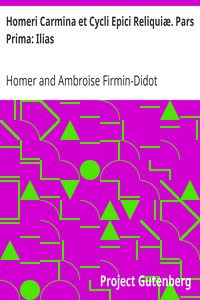Homeri Carmina et Cycli Epici Reliquiæ. Pars Prima: Ilias by Homer
"Homeri Carmina et Cycli Epici Reliquiæ. Pars Prima: Ilias" by Homer is a collection of ancient Greek epic poetry written in the early centuries BC. The text focuses on the events surrounding the Trojan War, particularly highlighting the conflict between the Greek hero Achilles and King Agamemnon. As one of the foundational texts of Western literature, it is renowned for its exploration of themes such as honor, rage, and the human condition
through its rich tapestry of characters and narrative. The opening of the Ilias sets the stage for the legendary conflict at Troy, beginning with the wrath of Achilles, ignited by a quarrel with Agamemnon over the distribution of war prizes. The narrative introduces key characters such as Chryses, the priest of Apollo, who petitions for the release of his captive daughter, Chryseis, leading to the catastrophic plague sent by Apollo when Agamemnon refuses. In an assembly called by Achilles, the cause of the plague is revealed, culminating in a fierce dispute between the two leaders. Achilles's withdrawal from battle establishes the central conflict that drives the narrative forward, as he seeks revenge against Agamemnon's slight. The opening effectively lays the groundwork for the epic's exploration of personal honor versus collective duty. (This is an automatically generated summary.)
Read or download for free
| How to read | Url | Size | |||
|---|---|---|---|---|---|
| Read now! | https://www.gutenberg.org/ebooks/52692.html.images | 1.3 MB | |||
| EPUB3 (E-readers incl. Send-to-Kindle) | https://www.gutenberg.org/ebooks/52692.epub3.images | 495 kB | |||
| EPUB (older E-readers) | https://www.gutenberg.org/ebooks/52692.epub.images | 514 kB | |||
| EPUB (no images, older E-readers) | https://www.gutenberg.org/ebooks/52692.epub.noimages | 487 kB | |||
| Kindle | https://www.gutenberg.org/ebooks/52692.kf8.images | 1.1 MB | |||
| older Kindles | https://www.gutenberg.org/ebooks/52692.kindle.images | 1.3 MB | |||
| Plain Text UTF-8 | https://www.gutenberg.org/ebooks/52692.txt.utf-8 | 961 kB | |||
| Download HTML (zip) | https://www.gutenberg.org/cache/epub/52692/pg52692-h.zip | 483 kB | |||
| There may be more files related to this item. | |||||
Similar Books
About this eBook
| Author | Homer, 751? BCE-651? BCE |
|---|---|
| Editor | Firmin-Didot, Ambroise, 1790-1876 |
| Title | Homeri Carmina et Cycli Epici Reliquiæ. Pars Prima: Ilias |
| Note | Reading ease score: 30.0 (College graduate level). Very difficult to read. |
| Note | Wikipedia page about this book: https://en.wikipedia.org/wiki/Iliad |
| Credits | Produced by Carolus Raeticus |
| Language | Latin |
| LoC Class | PA: Language and Literatures: Classical Languages and Literature |
| Subject | Achilles (Mythological character) -- Poetry |
| Subject | Trojan War -- Poetry |
| Subject | Epic poetry, Greek -- Translations into Latin |
| Category | Text |
| EBook-No. | 52692 |
| Release Date | Aug 1, 2016 |
| Copyright Status | Public domain in the USA. |
| Downloads | 708 downloads in the last 30 days. |
| Project Gutenberg eBooks are always free! | |


